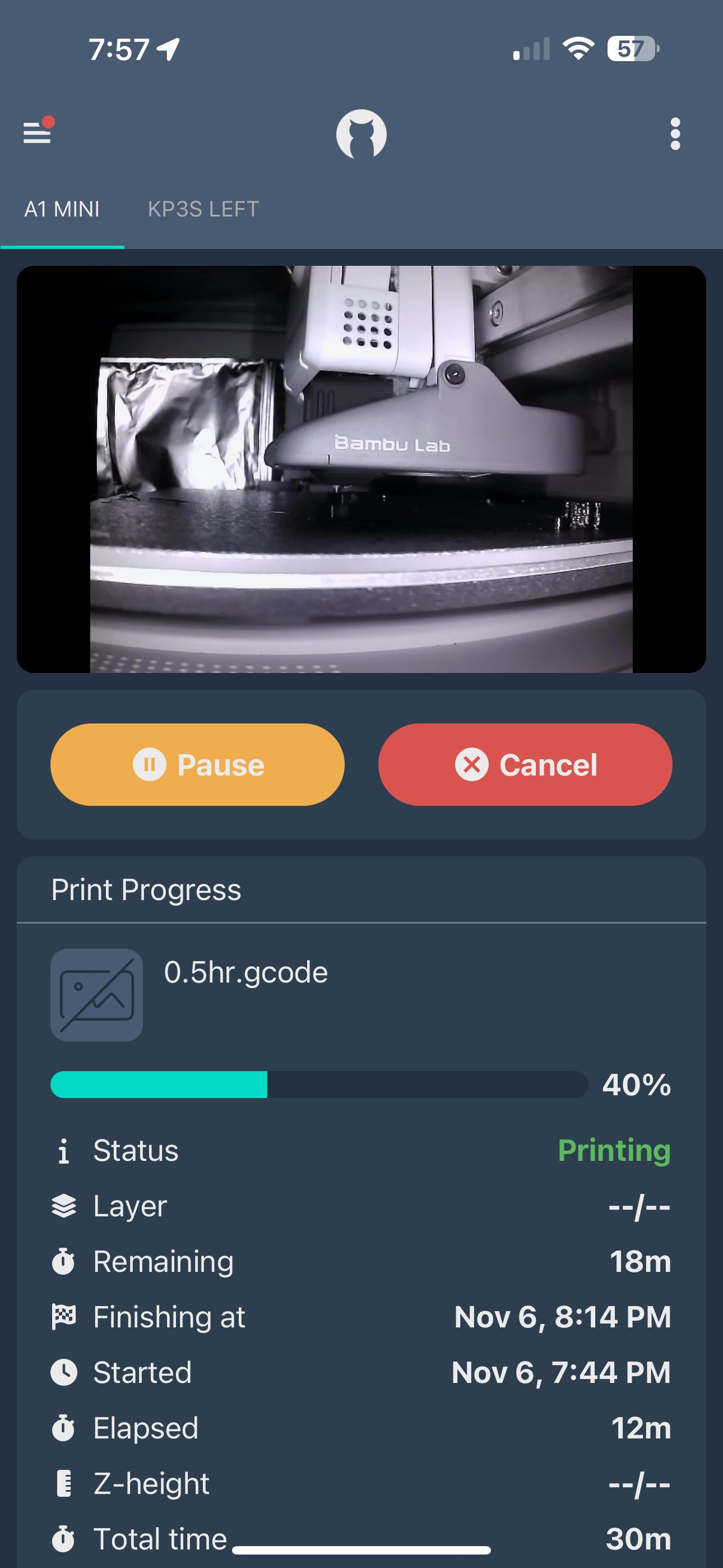obico-bambu-octoprint
This document & associated files describe a process to allow use of Obico failure detection to work with any non-Octprint/non-Klipper printer (i.e. your Bambu printers). Please continue reading for the requirements to make this work. I am using an Arducam USB camera with this mount on my Bambu A1 Mini.
Requirements
- Working Octoprint installation with Obico plugin. You need a camera that is designed to work with Octoprint (and Obico) natively (i.e. running on a Pi or other hardware - not virtualized). For my use case, I'm using a USB-connected Arducam.
- If you want the ability to "pause" the printer if there are issues, then you need an outlet that supports Tasmota (or can be turned on/off via a URL or command issued from Octoprint). Pause is accomplished by turning the printer off and back on (resume) and exploits Bambu's ability to do power outage recovery. You will still need to go into bambu handy and do a resume onve power is restored.
- Obico account that supports streaming.
- The .gcode files in the gcode directory. You can also make your own gcode files using the attached script. These files need to be uploaded to your Obico-files location within the Obico App (or website).
- A supported messaging app (via Octoslack). I use Pushover.
Setup
- Install Octoprint and plugins (Obico, OctoSlack, Virtual Printer).
- Make sure Webcam works.
- Enable Virtual Printer plugin and create a dummy printer; change the port to Virtual
- Setup OctoSlack for whatever notification platform you use.
- Enable Snapshot hosting
- Enable Print Paused (if you have a tasmota outlet); enable System Command and put
sh /home/pi/scripts/tasmota_off_bambu.sh
. You will need to create this file using info below. - Enable Print Resumed (if you have a tasmota outlet); enable System Command and put
sh /home/pi/scripts/tasmota_on_bambu.sh
. You will need to create this file using info below. - Enable Print Cancelling (only need to do this if your cancelled prints
don't immediately cancel); enable System Command and put
sudo service octoprint restart
. This restarts octoprint if you cancel your print. In my initial testing, cancelling took forever and restarting octoprint was the best option I've found to get it cancelled quickly. It seems OK now without this setting using the latest gcodes. - Enable Progress and setup whatever progress % you prefer.
- Create the on, off, and restart scripts if you have a tasmota plug.
- Contents should mimic the examples in this repo, but you should replace the IP address with the IP address of your outlet.
- Generate or use the pre-generated g-code files from the repository and upload them to the Obico App or website.
- Mount your camera somewhere where it can do valid spagetti detection. If you have a Bambu A1 Mini, I created a camera mount for it here.
Usage
- Start the print on your Bambu
- Start associated gcode via Obico app which is close as possible to how long your print will take.
- ... Profit.
If you enable detection, and your printer pauses, it should trigger the power to turn off on your printer. You will have to fix the issue then hit resume and it should come back.
Known Issues
- If you get Serial Timeout errors, you may have to edit this file on your Pi:
/home/pi/oprint/lib/python3.9/site-packages/octoprint/plugins/virtual_printer/virtual.pyand change the following lines.
read_timeout=150.0,
write_timeout=150.0,
You will also have to do this upon each Octoprint update unless the issue gets
fixed. (tracked here: [Octoprint issue 4907](OctoPrint/OctoPrint#4907)
Credits
- Thanks to Pr0Pain on the Obico Discord for the idea and initial g-codes.
